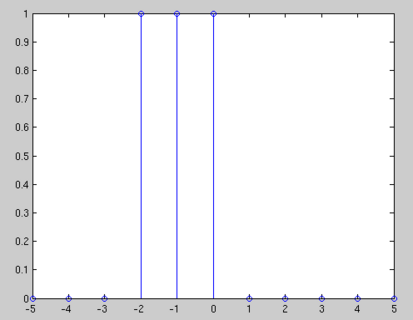Contents
[hide]Practice Problem on Discrete-time Fourier transform computation
Compute the discrete-time Fourier transform of the following signal:
$ x[n]= u[n+2]-u[n-1] $
See these Signal Definitions if you do not know what is the step function "u[n]".
(Write enough intermediate steps to fully justify your answer.)
You will receive feedback from your instructor and TA directly on this page. Other students are welcome to comment/discuss/point out mistakes/ask questions too!
No need to write your name: we can find out who wrote what by checking the history of the page.
Answer 1
$ x[n] = u[n+2]-u[n-1] $.
$ X_(\omega) = \sum_{n=-\infty}^{+\infty} x[n] e^{-j\omega n} $
$ = \sum_{n=-2}^{0} x[n] e^{-j\omega n} $
$ = 1+ e^{j\omega} + e^{2j\omega} $
Answer 2
$ X_{2\pi}(\omega) = \sum_{n=-\infty}^{+\infty} x[n] e^{-j\omega n} $
$ = \sum_{n=-2}^{0} x[n] e^{-j\omega n} $
$ = e^{2j\omega} + e^{j\omega} + 1 $
Answer 3
$ X_{2\pi}(\omega) = \sum_{n=-\infty}^{+\infty} (u[n+2] -u[n-1]) e^{-j\omega n} $
$ = \sum_{n=-2}^{+\infty} u[n+2] e^{-j\omega n} - \sum_{n=1}^{+\infty} u[n-1] e^{-j\omega n} $
$ = \sum_{n=-2}^{0} (u[n+2] -u[n-1]) e^{-j\omega n} $
$ = e^{2j\omega} + e^{j\omega} + 1 $
Answer 4
$ x[n] = u[n+2]-u[n-1] $
$ x[n] = ((\delta[-2]) +(\delta[-1]) +(\delta[0])) $
so $ X[Z] = e^(2 j \omega) +e^(j \omega) +1 $


